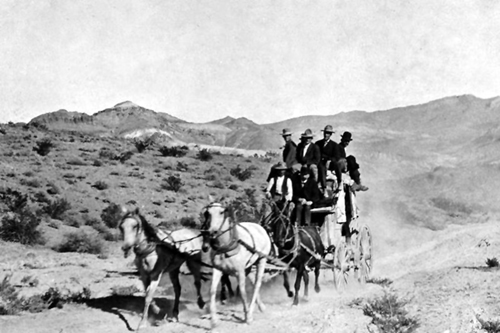
Wells Fargo shotgun messengers.
Now this is the kind of history I like digging into. I have talked about how important private security was during the early years of the US, like the Pinkertons, and Wells Fargo is another one to add to the list.
When you think of today’s Wells Fargo, you think of a large bank. You really don’t think about the history of the company and it’s impact on the expansion out west in early America. This book digs into that history, and specifically on the company’s use of armed guards or ‘shotgun messengers‘ for protecting valuable shipments. These men were called that because they were typically armed with shotguns.
In Iraq or Afghanistan, a large portion of security contracting work involved protecting goods and people during transport through really bad places. The vernacular of these wars included terms like Trunk Monkey, or the guy in the back of the truck or suburban armed with a machine gun to cover the rear sector of a convoy or motorcade. Back in the wild west, it was ‘shotgun messenger’ or what the novelists and journalists coined as ‘riding shotgun’. Yep, next time you hear someone say ‘I get shotgun’, that is a phrase that was directly born out of the wild west when Wells Fargo’s used armed guards on stage coaches and trains.
In popular culture, the shotgun messenger was definitely represented in film. Here is one called Tales of Wells Fargo that ran for 6 seasons back in the fifties and sixties.
Here is a description of the book.
The true stories of the Wild West heroes who guarded the iconic Wells Fargo stagecoaches and trains, battling colorful thieves, vicious highwaymen, and robbers armed with explosives.
The phrase “riding shotgun” was no teenage game to the men who guarded stagecoaches and trains the Western frontier. Armed with sawed-off, double-barreled shotguns and an occasional revolver, these express messengers guarded valuable cargo through lawless terrain. They were tough, fighting men who risked their lives every time they climbed into the front boot of a Concord coach.
Boessenecker introduces soon-to-be iconic personalities like “Chips” Hodgkins, an express rider known for his white mule and his ability to outrace his competitors, and Henry Johnson, the first Wells Fargo detective. Their lives weren’t just one shootout after another—their encounters with desperadoes were won just as often with quick wits and memorized-by-heart knowledge of the land.
The highway robbers also get their due. It wouldn’t be a book about the Wild West without Black Bart, the most infamous stagecoach robber of all time, and Butch Cassidy’s gang, America’s most legendary train robbers.
Through the Gold Rush and the early days of delivery with horses and saddlebags, to the heyday of stagecoaches and huge shipments of gold, and finally the rise of the railroad and the robbers who concocted unheard-of schemes to loot trains, Wells Fargo always had courageous men to protect its treasure. Their unforgettable bravery and ingenuity make this book a thrilling read.
Here is a clip from the introduction of the book. I thought this was interesting about actual numbers of armed guards.

From the introduction of the book.
Here is a review of the book by Criminal Element.


